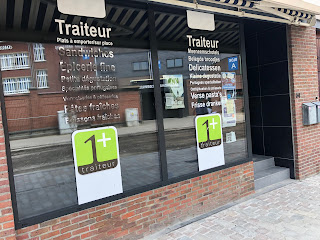I accompanied my friends to the
polling station on Election Day, where elections were being contested at the
regional, national and European levels. Voting is compulsory in Belgium;
failure to present yourself at the polls elicits a modest fine. Voting is
considered one of the obligations of a citizen living in a democratic society. Of
course, the government cannot make you cast a vote. A person could simply leave
the ballot blank, or even spoil it. In such case, the voter will have fulfilled
his or her civic duty.
Over breakfast before going to
the polls, L expressed his frustration at what he saw was increasing belief that
the relationship between the people and the government was one of all rights,
without obligations on the part of citizens. Thus, very few people were
interested in performing the duties, services and niceties that make a
democratic society work. But people demanded more rights without consideration
of its effects upon others. He worried that this trend toward, what I would
call individualism or narcissism was eroding the democratic nature of Belgium.
 |
| The Language Border in Belgium |
Meanwhile, G was concerned about
the future of her village, one where she grew up and lived most of her life.
She opined that the village was not the same place as when she grew up. The
influx of Francophones had substantially changed the village. In Belgium,
Flanders is Flemish-speaking, Wallonia French-speaking, and the city of Brussels
is officially bilingual, however historically dominated by Francophones. Brussels
is completely encircled by Flanders, with a thin strip of land that separates
the city from Wallonia. L and G’s house, located in Flanders, just south of
Brussels. is situated less than a quarter of a mile from the language frontier,
the official divide between Flemish and French speakers. Francophone Belgian
citizens who have moved to the Flemish villages that encircle the capital, have
established their own organizations and social networks, demanding more
services be provided to the citizens in French. G worries that this is diminishing
the Flemish language. Because the new people have a limited knowledge of Dutch,
it did not allow anyone to know and use the complexity and beauty of the
language.
 |
| Political Protest in Flanders |
As we arrived at the Catholic
school a that served as the polling station, friends and neighbors greeted one
another with handshakes and cheek-to-cheek air kisses. Because everyone is
compelled to appear at the polls, on a Sunday between 8am and 2pm, there
is a good chance that people will see several people they will know. Whether
people like it or not, compulsory voting is an opportunity to visit and connect
to the community. Walking to the poll, L points out a restaurant and caterer in
center of the village, one that has its services listed in Flemish and French. Someone
has used black paint in an attempt to mask the French words. Although the language issue is often
discussed, it is one of the few instances of political protest I have seen in
the years I have been coming to Belgium and Flanders.
Given the number of political
parties, the ballot is large. Sample ballots line the walls. A bulletin board
that separates the line from the voting area. On it is posted the relevant
statutes regarding election. Hanging from a long piece of twine is a 300-page
booklet, in both French and Dutch, enumerating the rules and procedures of
elections used, presumably, in case of a dispute. Despite the hundreds of
people queuing to vote, I am the only person who casually wonder over to thumb
through it.
After voting, L and G had another
task: G’s brother and wife were on holiday in Greece. In what is a complete
anathema to Americans, they would L and G would go to vote in their place. We
walked over to another of the village’s polling place, this time in a primary
school where G once taught, my friends produced a letter from the mayor and an affidavit
signed by the principles and cast ballots on their relative’s behalf. At once
it seemed opened to malfeasance and fraud, but in light of the mandate of compulsory
voting, it makes complete sense.
The entire process was one in which
the act of voting was not merely a right that once could exercise, it was a duty
that citizens were expected to perform. From my perspective it promoted a sense
of community. Each and every person, often with children in tow, were expected
to present themselves to express their ideas and opinion on government. No one
is left out; no one excluded. A chance for the people to make their voices heard.
No comments:
Post a Comment